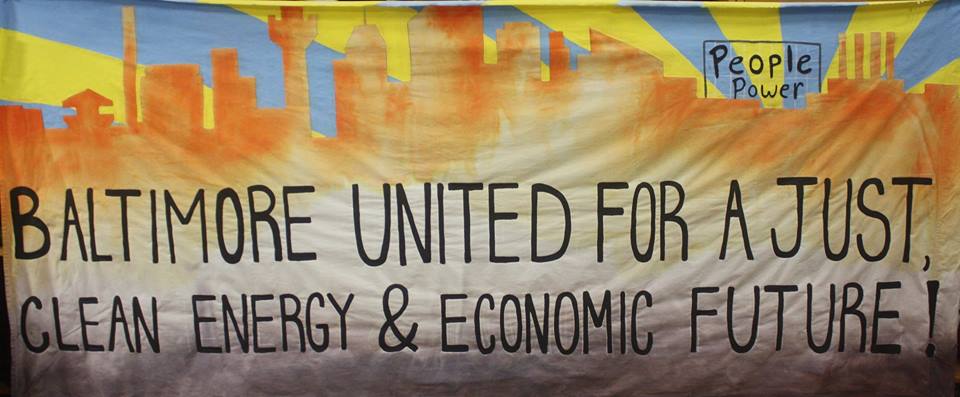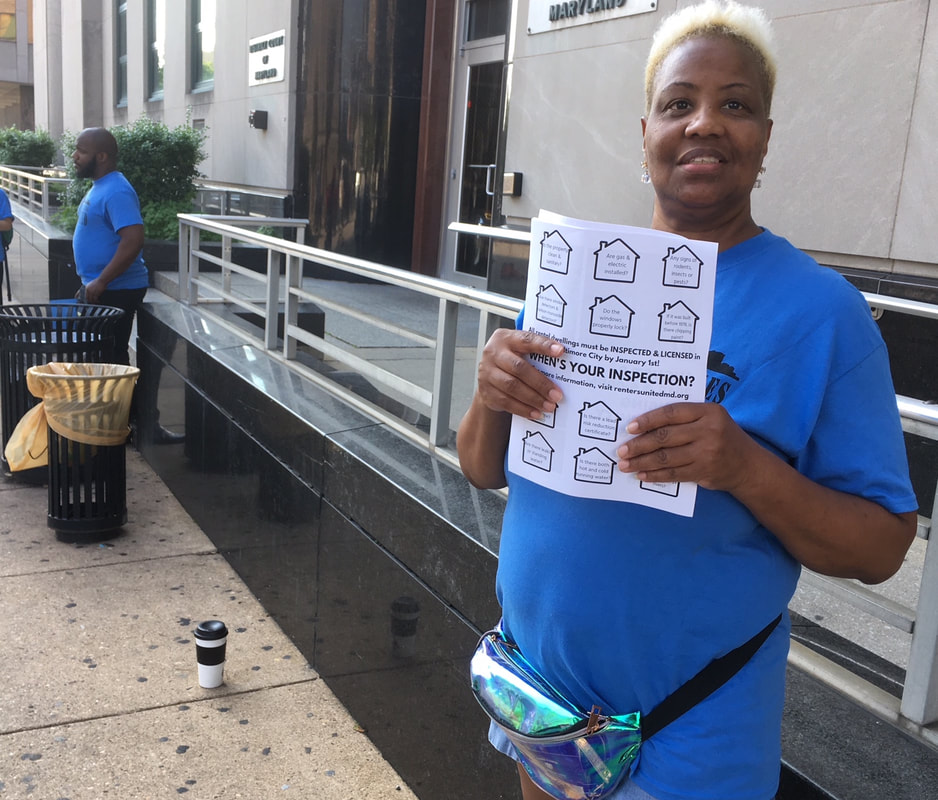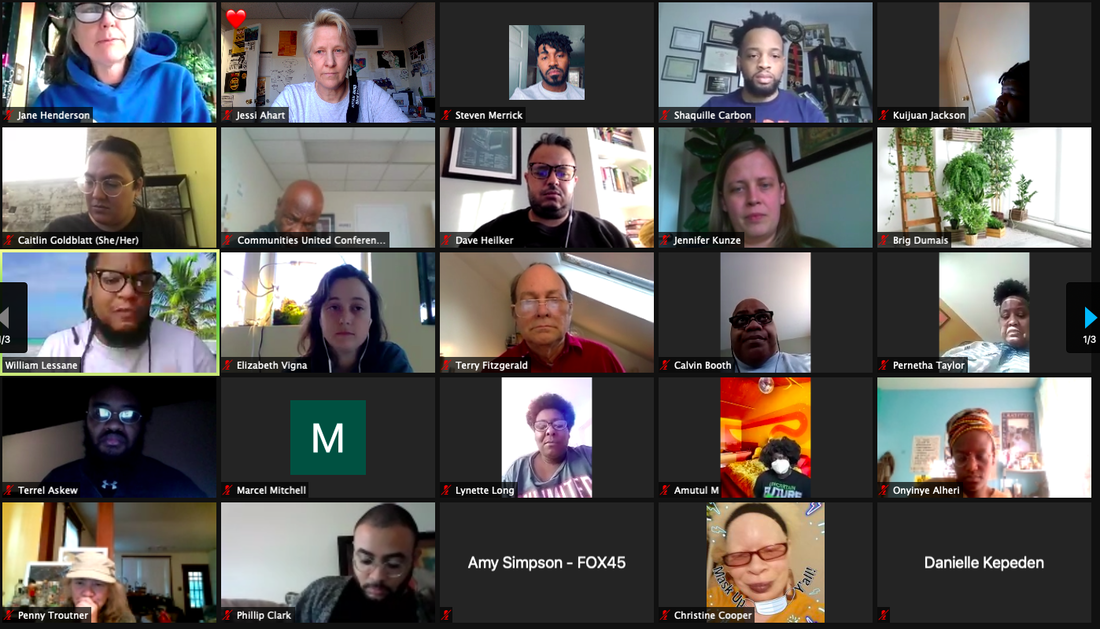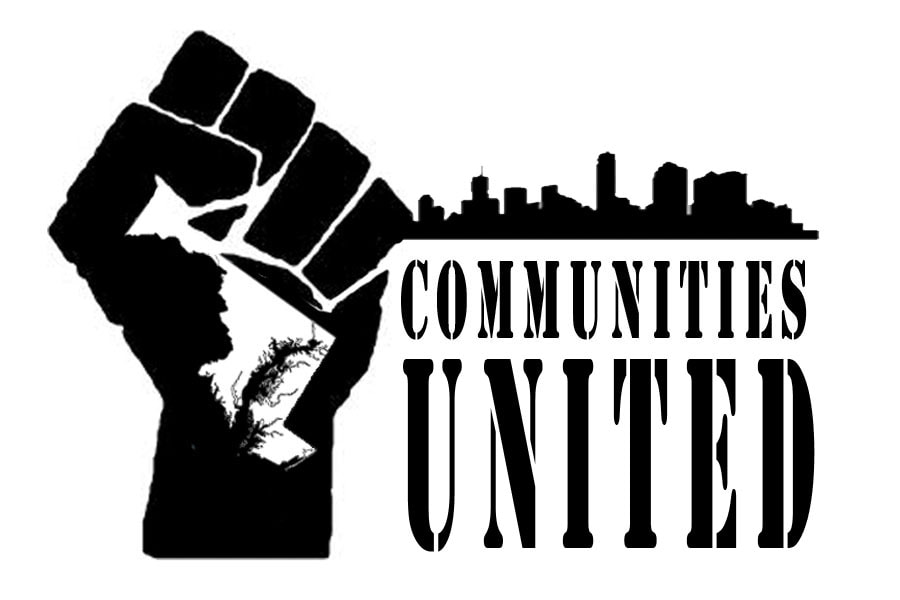|
Fair Funding Coalition Calls on Legislature to Commit to Passage of Full Kirwan Commission PlanDecember 5th 2019
The Maryland Fair Funding Coalition, representing more than a dozen organizations around the state, issued the following statement about Governor Larry Hogan’s remarks today regarding the Kirwan Commission’s recommendations to strengthen public education. “Passing the Blueprint for Maryland’s Future is critical for Maryland students and our state’s future economic success. Rather than being a partner and a leader in advancing this ground- breaking legislation, the governor continues to make misleading statements while raising unlimited ‘dark’ money behind the scenes to fight these reforms. “Marylanders overwhelmingly support investments in public education and strongly back the key planks of the Blueprint. The Kirwan Commission plan already includes new accountability measures to ensure public resources are well spent. “We can afford to invest more in our schools if we take a few steps to clean up our ineffective tax code: eliminate ineffective tax breaks and close loopholes that benefit wealthy individuals and large corporations. “We urge legislators to act in the next General Assembly session to pass the Blueprint and identify a fair revenue package that ensures we can make this vision a reality. Our kids can’t wait another generation to receive the great education they deserve.” The groups endorsing this call to action include: Baltimore Teachers Union, CASA, AFSCME MD, Communities United, Good Jobs First, Maryland Center on Economic Policy, Maryland Nonprofits, SEIU Local 500 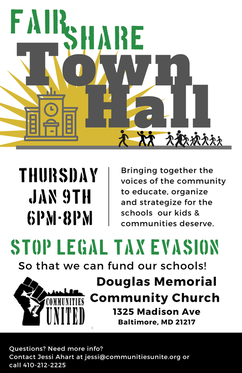 On January 9th at 6pm, we are gathering at Douglas Memorial Community Church to discuss and take action on the Baltimore City Budget, as well as the one in the state of Maryland. Without work and some significant changes at BOTH levels, our schools will remain underfunded for the next ten years! Public schools in Maryland and Baltimore City are grossly underfunded. It’s time for the Maryland General Assembly and Baltimore's Mayor and City Council prioritize a meaningful solution - one that addresses all aspects of the problem - so that every child and every neighborhood has a great public school. We demand that our state legislators recognize:
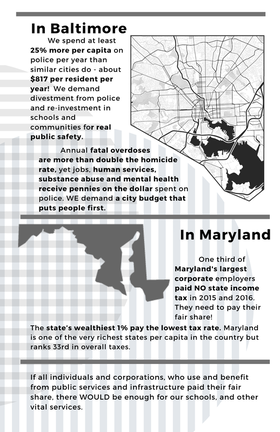 We need to fix our tax system to support significant new state investments in education and ensure that large corporations and wealthy individuals are paying their share for the public services we all rely on. We demand that our Mayor and City Councilmembers:
This content is from the our partners at the Center for Progressive Democracy
Medicare for All, the only truly single-payer, universal health care system, guarantees that health care is a right and enables every person living in the United States to receive the health care they need to survive and thrive. August 20, 2019 Dear Honorable Members of the United States Congress: As organizations that represent people of color, we respectfully urge you to co-sponsor the “Medicare for All Act of 2019” (H.R. 1384/S. 1129). Medicare for All, the only truly single-payer, universal health care system, guarantees that health care is a right and enables every person living in the United States to receive the health care they need to survive and thrive. Despite many gains, 30 million people in the United States lack health insurance, and tens of millions of households have health insurance but cannot afford to receive the medical care they need. One in five working-age Americans report having problems paying their medical bills despite having health insurance, driven by pocketbook-busting premiums, copays and deductibles.[1] Universal health care is also a racial justice necessity because communities of color, in particular, suffer from a lack of access to affordable health insurance. People of color make up 42% of the nonelderly U.S. population, yet account for over half of the total nonelderly uninsured population. Latinx and Black people have significantly higher uninsured rates (19% and 11%, respectively) compared to white people.[2] Medical debt remains a glaring issue for Black Americans. Nearly one in three Black Americans aged 18 to 64 has past-due medical bills.[3] Black uninsured populations face burdensome out- of-pocket medical expenses when seeking care, which often means they are forced to delay preventative care and get treated as a last resort – the most expensive form of treatment.[4] Latinx patients are the most uninsured population in the United States today. Latinx individuals already comprise much of the workforce that is unable to get health coverage through their job. Lawmakers have curtailed the Affordable Care Act’s health enrollment program, which has severely challenged the ability of outreach workers to reach Latinx patients for new coverage. Undocumented Latinx patients suffer further as they are ineligible for government-funded insurance and subsidized private health plans. Despite the fact that undocumented adults pay taxes[5], they are ineligible to receive Medicaid health benefits and financial subsidies to buy health plans from the federal-state health insurance marketplaces. Disturbingly, racial bias mars the entirety of American health care. In particular, Black maternal and prenatal health access remains in crisis levels. In the state of New York between 2013 and 2015, 54 Black women died for every 100,000 births -- nearly four times the rate of white women.[6] Indeed, half of maternal deaths in our country are preventable.[7] While there are many reasons why Black mothers and mothers-to-be experience poor treatment and care, a lack of quality health access is a significant factor. Medicaid – a lifeline for many people of color and low-income patients – is not accepted at many hospitals and doctors’ offices. Black and low-income women are more likely than others to be treated at under-resourced hospitals, increasing the chances they may experience complications during and after childbirth. Hospital quality can account for nearly 50%t[8] of the racial disparity in maternal illness. With Medicare for All, there are no “out of network” provider limits. Patients can get the care they seek, when it is appropriate and convenient for them. Communities of color need a health care system that rectifies these long-standing structural biases and challenges. Medicare for All is that system. Medicare for All universal health care would support the health and economic security of patients of color, including finally providing full health coverage for all reproductive health services, alongside controlling the costs of prescription drugs – both glaring affordability and access issues for low and moderate-income patients of color. Some health plans sold on the federal and state health insurance marketplaces discriminate on the basis of drug affordability for certain diseases, such as HIV/AIDS. By categorizing medications for particular conditions in the highest co-payment "tier," these plans price out patients with those ailments. These additional co-payments can result in thousands of dollars a year in extra expenses, crushing millions of households of color as they seek the care they need to survive. There is only one form of universal health care that covers everybody, without exception, and lowers overall health care expenditures. Just as the passage of Medicare over 50 years ago helped spur hospital integration and improved health access, it can today usher in true universal health care. It is time for Medicare for All.[9] We implore you to join the movement in support of this bill. Sincerely, A. Philip Randolph Institute Action Center on Race and the Economy (ACRE) Black Women's Health Imperative Center for Popular Democracy Color of Change League of United Latin American Citizens (LULAC) NAACP People's Action Policy Link United We Dream Maryland Communities United
We are asking Baltimore organizations who share our perspective on this budget to please sign below. We will be hand delivering the letter and signatures on the morning of Friday, May 24th.
Mayor Bernard ”Jack” Young
Baltimore City Hall Dear Mayor Young, Congratulations on your new job as Mayor of Baltimore. You take office at a difficult time when our city needs bold leadership to restore public confidence that good government is possible. We, the undersigned organizations in Baltimore, urge you to be that bold leader by making significant revisions to the Fiscal Year 2020 budget that you inherited from the previous mayor. The FY2020 budget currently proposed does not reflect the morals of our organizations or the needs of the people of Baltimore. For every general fund $1.00 spent on police, Pugh’s budget would spend 53 cents on schools, 15 cents on housing and community development, 13 cents on human services, just over a nickel on jobs ($.06) and only one penny on substance use disorder and mental health. In fact, Baltimore spends much more per capita on police than similar cities -- at least 25% more. In 2017, Baltimore spent $772 per resident, while Detroit spent $450, New York $581; and Houston $383. And the rate in Baltimore increases to $817 per resident in proposed FY2020. Over the10 years, spending on the Police and Sheriff’s Departments has grown by 67%, from $317.2 million in FY2010 to $527.2 million in FY2020. It’s grown faster than the city’s overall General Fund, which increased by only 44% over the same time. Meanwhile, twice as many people in Baltimore are dying of overdoses as murder. If ever increasing police spending worked, Baltimore would be one of our nation’s safest city. Instead, we have been deemed the most dangerous by both the FBI and USA Today. We need very different budget priorities. We call on you to make a commitment to right-size Baltimore’s police budget by ultimately moving 25% from policing to investments that will actually build a safe and thriving city. Demonstrate this commitment now by moving 5% ($26 million) from the proposed FY2020 policing budget. The list of needed, alternative investments is long: fully fund our schools, flood the streets with overdose reversal kits, create good jobs, particularly for residents who are formerly incarcerated or facing other roadblocks to meaningful, sustaining work. You have a unique opportunity to break from the past and set Baltimore on a different course, restoring hope with a new moral compass. We urge you to take it. by Jennifer Flynn Walker
Watch Ady Barkan testify to the House Rules Committee on Medicare for All-Watch the Livestream Comrades, Today, affiliates from New Georgia Project, SPACES, Rights and Democracy VT & NH, Maryland Communities United, Birddog Nation, and allies from Rise and Resist joined several hundred activists from National Nurses United, People's Action, Our Revolution and Democratic Socialists of America to stand in front of PhRMA to demand Medicare for All. Bonnie Castillo, the President of NNU, kicked off the rally recanting how everyday the decisions of nurses and doctors are overruled by insurance executives putting the lives of their patients at risk. Angelique Speight, a member of SPACES, was one of the most powerful speakers asking the crowd if they "loooovvveed their Health Insurance provider. If they lovvveed Aetna, or Cigna". It blew apart the most pervasive argument against Medicare for All. MSNBC has asked to have her on the air. Fingers crossed that it works out. Speaker after speaker clearly made the policy case for Medicare for Alll. However, by far the most powerful moment happened when Ady Barkan's speech was read by Darius Gordon as a Mic Check. Ady led us through the words, "I HATE PHRMA! I HATE PHRMA! and then, "WE ARE GOING TO WHOOP YOUR BUTT!" After hearing about the 28 mother of two who died of cancer, spending her last year in fights with her insurance company and leaving her family in poverty, it felt so fucking good to say that. The rally ended with hundreds of Go Fund Me's for healthcare stories band-aid taped to the walls of PhRMA's headquarters. Here's the thing. I don't usually lose campaigns. And I don't intend to lose this one. We have a once in a generation opportunity to make healthcare a right in the US. Wednesday, May 1, Ady Barkan, who traveled thousands of miles, at a great risk to his life, testified before the House Rules Committee. This is the first hearing on Medicare for All in 40 years. You can watch here: www.facebook.com/BeAHeroTeam/ OR here: rules.house.gov Special thanks to Darius Gordon, Julia Peter and Tracey Corder who made today's action fire. PhRMA was terrified. If you would like to join the Medicare for All Strategy Team at CPD, we meet every first Thursday of the month at 1pm. https://zoom.us/j/4900930821 OR +1 408 638 0968; 4900930821#. The next one is this Thursday, May 2nd. Thank you! --Jennifer Communities United is a proud partner of the Baltimore People's Climate Movement. We are a decentralized, leader-full group of organizations, activists, and residents working to build the New Energy & Economic Future by undoing environmental racism in Baltimore. Our table of partners meets regularly to support one another in our collective struggle by directing energies toward ongoing work.
Next week, our lead organizer Nabeehah Azeez will be on the panel for our New Energy & Economic Future Town Hall. Mustafa Santiago Ali, Senior VP of Climate, Environmental Justice & Community Revitalization for the Hip Hop Caucus, will open this town hall with a special video message. Then leaders from labor, climate, and local grassroots groups will dig into how we can build green industries in Maryland that protect our climate, provide clean, affordable power, and create family-sustaining jobs. Throughout the evening, you’ll have the opportunity to ask questions and engage in the conversation. The panel will be moderated by Marc Steiner (host of the Marc Steiner Show and founder of the Center for Emerging Media) and Khalilah M. Harris (host and executive producer at the Real News Network). Can you join us on August 28th at 231 Holliday Street at 5;30pm for this panel? RSVP here! Visit Baltimorepcm.org for more information about the People's Climate Movement CU Members share new rental inspection guidelinesIn March 2018, CU worked with renters advocates from across Baltimore City on sweeping reforms for rental housing. Landlords have from now until January 1 to inspect, repair, and license their 1-2 unit dwellings to rent them. For more information, visit rentersunitedmd.org or check out the press coverage from the action.
With Sweeping rental housing law now in effect, advocates push tenants to get their homes inspected, Baltimore Fishbowl Of Mice and Mold and a New Law that says renters needn't put up with squalor, Baltimore Sun Advocates help Implement New Housing Law, WYPR |

